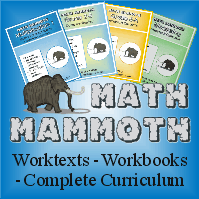It is surprising when an education method that seems so simple actually produces a broad foundation that allows a student to learn at a deeper level all through his life.
When I first read the suggested Language Arts Scope and Sequence at Ambleside Online, I was not convinced that it could really produce strong results. How can a child get ahead with only doing phonics, oral narration, and copywork until third grade? Yes, they add in written narration and beginning grammar in upper elementary. But to wait until junior high for formal grammar and high school for formal composition? Shouldn't a student be doing a lot of writing and have had several years of grammar instruction by then? That just doesn’t make sense . . . or does it?
Looking back on the journey of my two older daughters (just finishing 7th and 9th grades), I see the beauty in AO's suggestions. It is much easier to tackle grammar in a short period of time after the student has entered the logic stage. He is then able to think abstractly instead of trying to analyze grammatical concepts with a concrete thought process in the early years. We’ve experienced that and I have no interest in beating my head against the wall for multiple years again.
Just because you don't teach "formal" grammar until junior high does not mean the student is not learning any. There are plenty of opportunities to teach proper sentence structure, capitalization, punctuation and more while you are working with written narrations. But it is all done in a concrete manner that your grammar student can understand. Then when the student reaches the logic stage of thinking, he is ready to analyze those concrete things he has previously learned. Just this time it is in the abstract way that formal grammar requires. No wonder grammar is such a struggle for some students. We are trying to teach them logic stage material when their brains are not ready for it.
Now about composition - you have been teaching it all along in the form of oral and written narration. I did not fully grasp the power of narration until I started using it in our homeschool. It seems so simple on the surface. "Tell me what we just read about." But have you ever stopped to think of the skills required to do that? You have to listen intently, recognize and remember the important details, and organize and put that information into your own words so you can tell it back. Sounds like a whole lot of skills necessary for composition.
When you look at what skills narration produces, it really is not so simple. It requires active mental participation on the part of the student. And that takes hard work and discipline. These character traits, along with the academic skills acquired, provide the student a strong foundation allowing him to go on to a deeper life of learning.
So it is not about giving your student piles and piles of writing assignments. And it is not about doing grammar lessons year after year. It is about the student being actively involved in the process of learning. And the best way to accomplish that is to teach your child the necessary concepts when his brain is most able to absorb the information. We have experienced that this “simple” method is very effective in building a strong foundation for deeper learning.
You can find further information on Charlotte Mason's language arts methods here.
Wednesday, May 26, 2010
Subscribe to:
Post Comments (Atom)











4 comments:
Exactly! AO is one of the best resources available.
The only issue I have with AO is that there's too much reading for me to be able to listen intelligently to narrations. Otherwise we'd go back to it in a heartbeat.
Annie Kate
We don't use Ambleside Online, but we also delay formal grammar and writing instruction until our children are older.
April E.
http://homeschoolblogger.com/elcloud
Very thought provoking Cynthia. My children have done very well in grammar in the early years so I haven't had that banging my head against the wall feeling. But my third child is definitely going to have to wait, so it's reassuring that he can catch up. And if he can catch up, was it a big waste of time teaching it earlier? Hmm...
I need to look at AO again, mostly for reading suggestions for the boys. It was just this past year that I decided doing 'grammar' with the younger ones via workbooks was almost pointless. We just started Analytical Grammar for my now 8th grader this spring and it is going so much better than the years of headbanging we had. My now 5th grader is just starting the Jr. version and things are starting to click a bit more for him. While my rising 2nd grader could probably do the workbooks his brothers used with no ill effects, I can't see spending the time on it compared to other fun things.
Thanks for the reminder of how powerful narration can be.
Post a Comment